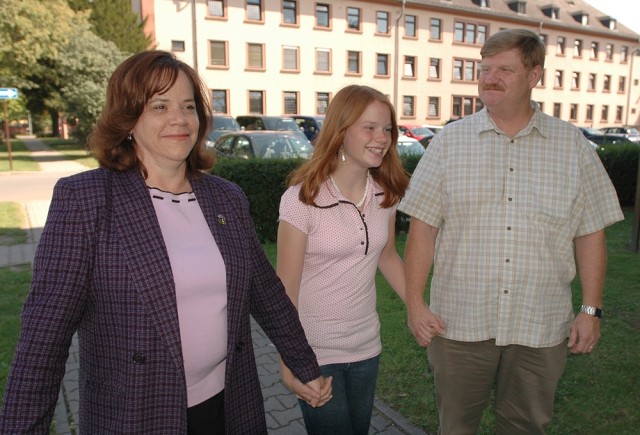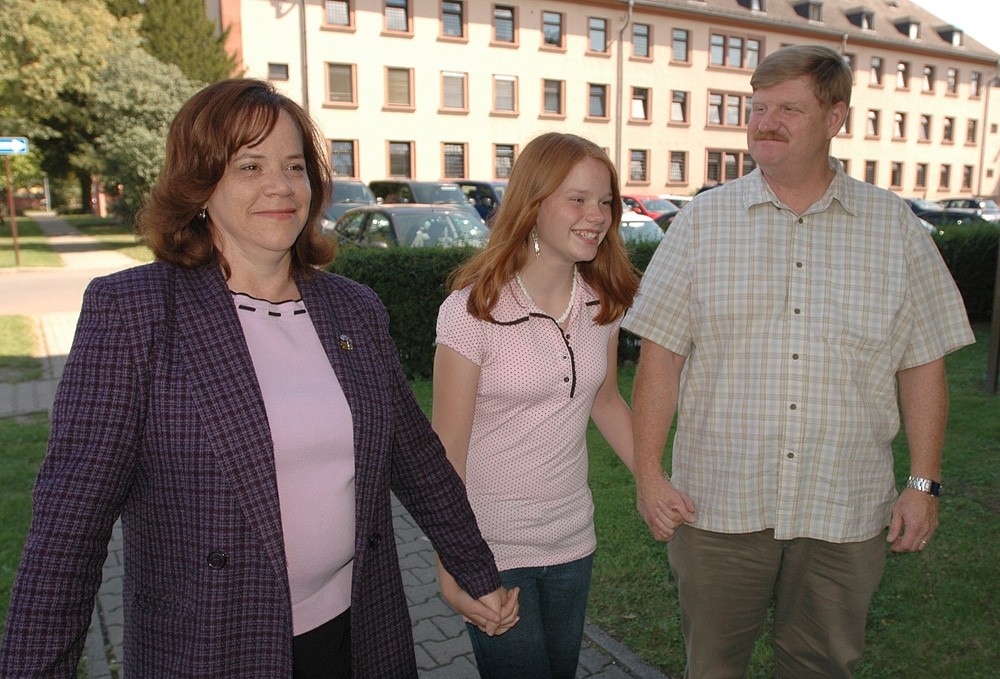HEIDELBERG, Germany - There are several simple descriptions for cancer. According to the National Cancer Institute, it is a term for diseases in which abnormal cells divide without control.
Don, Cyndia and Larla Halsey have discovered, however, that the devil of cancer is in the details. In April of 2004, they began to learn more about the disease, their family and the generosity of a community than they ever thought possible - all because of a mole.
Cyndia, auburn-haired and full of energy, is a management analyst with U.S. Army Europe's Resource Management Office. A mole on her leg had been bothering her for some time, but she was told initially there was nothing abnormal.
"I saw a dermatologist in the states who said it was just an ingrown hair and didn't test it," she said. "Then when I came here I was sent to a dermatologist downtown that did test - and found that it was melanoma."
Her husband, Don, is blond and fair, now retired from the military after 30 years. He acts as house dad to daughter Larla, whose red hair is a perfect blend of her parents'.
"In a couple of weeks I went from knowing zero, to almost knowing too much," Don said. "Just about everything we were reading wasn't good news."
Melanoma is the most serious form of skin cancer. If recognized and treated early, it is nearly 100 percent curable. But if it is not, the cancer can advance and spread to other parts of the body, where it becomes hard to treat and can be fatal. While it is not the most common of the skin cancers, it causes the most deaths.
The identification of the melanoma led to further testing, where it was found that cancer had spread to the lymph nodes.
"When they checked out her liver and discovered it was (non-Hodgkins lymphoma) it was like the better of two evils," Don said.
Non-Hodgkins lymphoma describes a diverse group of cancers affecting the lymphocytes, a type of white blood cell. There are many varying courses, treatments and prognoses.
"I'm a glass-half-full kind of person; I figure that if they say the survival rate after five years at my stage would be less than 15 percent, then somebody has to be in that 15 percent," Cyndia said.
Don's admiration for his wife's strength is obvious, and they hold hands often when talking about their trials.
"She has actually had the best attitude about this that you could imagine," Don said. "The only time that I saw her down is when she went through the chemo at Walter Reed,"
The type of chemotherapy Cyndia needed was not available in Europe, prompting the first of several medical evacuations to Walter Reed Army Medical Center in Washington DC, and MD Anderson Cancer Center in Houston. Larla, then 8 years old, took notice of the situation.
"I didn't realize it was such a big deal until we had to go back to the states," she said.
"I've learned a lot more (since then) about the importance about getting checkups, about cancer, and I've been doing more around the house with chores and stuff," Larla said.
"But I've learned other things. When I was on the (evacuation plane), I realized how many people are getting hurt in Iraq, and what the medical people do for them," she said. "Cancer has changed my idea of friendship."
Don's face furrows recalling the following year, beginning with a cycle of driving Cyndia to and from Walter Reed five days a week, starting at 9 a.m. and returning at 5 p.m., so she could spend more time with the family.
"It was just the constant surgery, one procedure after another, one diagnosis after another, finding new things and learning about new things. The constant drag of not knowing when it is going to stop," he said.
"From the time Cyndia was first diagnosed until last February, she went through four or five major surgeries and three minor ones, and they were right after another."
During her absences, she said, she was stunned at how much support came from sources near and far.
"I'm used to being independent, we've always taken care of ourselves as a family, and we've always done a lot of volunteer work, typically as a family," she said.
"Now the shoe was on the other foot, and I found it much harder to accept help than it ever was to give help. The chapel and the schools here were very supportive. Larla's teachers sent her assignments, and her classmates sent cards," she said, smiling and holding Don's hand.
This kind of reassurance is very important to people going through cancer, Cyndia said.
"Getting an e-mail that says, 'Thinking of you - hope you are having a good day' can make a tremendous difference when you are in the middle of chemo. Everything else can be bad, but you can think 'they haven't forgotten me,'" she said.
It made a difference to the Halsey's. Don said he probably had 10 or 15 e-mails a day with offers of love and support.
"The strange thing was we never had to ask," Don said. "They just did it. I called back to check Cyndia's leave balance, and the response was 'Don't worry about it, just don't worry about that.'"
Her cancer now in remission after surgeries and chemotherapy, Cyndia's life cycles in quarterly increments around a three-day set of scans to search for a flare up.
"During that three-day period for her tests, you are just holding your breath, because you don't know what you are going to find," Don said.
It will be a lifelong process. "Every three months," Cyndia said, 'and in between you live your life. You just keep hoping for good results."
During a family vacation to Italy, Cyndia caught herself paying more attention to the details. "Those memories are priceless."
"Everywhere is our favorite spot," she said. "It's all different and we like to drink it in."
On Sept. 14, Cyndia and her family will participate in Heidelberg's Answer the Cancer Awareness Laps for Life (C.A.L.L.), a community cancer awareness program open to the public. It will begin at 6:30 p.m. and end the following morning, because cancer never sleeps.
CANCERtypes
Carcinoma - cancer that begins in the skin or in tissues that line or cover internal organs, such as Cyndia's melanoma.
Sarcoma - cancer that begins in bone, cartilage, fat, muscle, blood vessels, or other connective or supportive tissue.
Leukemia - cancer that starts in blood-forming tissue such as the bone marrow, and causes large numbers of abnormal blood cells to be produced and enter the blood.
Lymphoma and multiple myeloma - cancers that begin in the cells of the immune system, such as the non-Hodgkins lymphoma Cyndia was later diagnosed with.
Central nervous system cancers - those that begin in the tissues of the brain and spinal cord.
INFOsites
National Cancer Institute -- http://www.cancer.gov/cancertopics
MD Anderson Cancer Center -- http://www.mdanderson.org/
Skin Cancer Foundation -- http://www.skincancer.org/
Answer the C.A.L.L. signup -- http://www.lifelaps.org/index.html
(Arthur McQueen is a member of the USAG Heidelberg Public Affairs Office)


Social Sharing